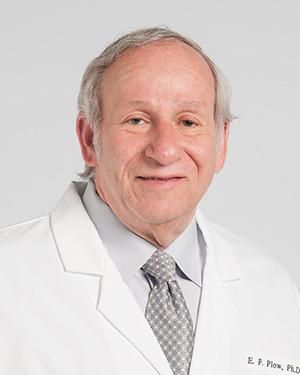Research News
09/30/2021
Large $12M Grant to Support Team Science into the Biology of Cardiovascular Disease
Dr. Plow is the program director for a recently awarded program project grant from the National Institutes of Health that will enable research into the function of integrins in blood and vascular cells, and how their interactions with other proteins may drive disease.

Cleveland Clinic has received a new five-year, $12 million grant from the National Heart, Lung, and Blood Institute to investigate the molecular and cellular mechanisms underlying cardiovascular and inflammatory diseases. The collaborative grant—which brings together researchers from across the city of Cleveland—will focus specifically on defining how a class of receptors called integrins contribute to disease development and progression.
“The long-term goal of our research will be to gain important insights for developing new therapies to treat or prevent blood, cardiovascular and inflammatory diseases,” said Edward Plow, PhD, staff in the Department of Cardiovascular & Metabolic Sciences, and the grant’s program director.
The large collaborative grant will support three related research projects led by Dr. Plow; Jun Qin, PhD, Department of Cardiovascular & Metabolic Sciences; and Daniel Simon, MD, University Hospitals and Case Western Reserve University. All three respective projects will focus on defining the role of integrins, which play an important role in cell adhesion and migration—both of which are critical for an array of physiological processes ranging from blood clotting to host immune defense.
Dr. Plow’s project will focus specifically on a protein named kindlin-2. Previous research has shown that kindlin-2 plays an important role in activating—or “turning on”—integrins. Kindlin-2 has been suggested to bind with dozens of other proteins at multiple different sites, as well, so Dr. Plow plans to study the structure and function of kindlin-2 in various types of blood vessel cells. His team will also use preclinical models to understand how the presence or absence of kindlin-2 in blood vessel cells affects disease-predisposing processes like angiogenesis, vascular permeability and would healing.
In complementary projects, Dr. Qin, who holds the Bonnie and Eunice Collins Endowed Chair for Innovative Diabetes Research at Cleveland Clinic, will study another protein implicated in integrin activation named talin, and Dr. Simon will study an integrin on white blood cells named Mac-1, investigating its potential involvement in inflammation and thrombosis.
“Although we will primarily be studying the structure and function of these small molecules, our findings stand to have a big impact on our understanding of pathologies that underlie many different diseases,” said Dr. Plow.
Featured Experts
News Category
Related News
Research areas
Want To Support Ground-Breaking Research at Cleveland Clinic?
Discover how you can help Cleveland Clinic save lives and continue to lead the transformation of healthcare.
Give to Cleveland Clinic